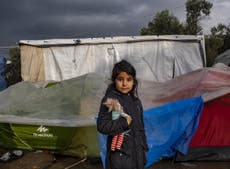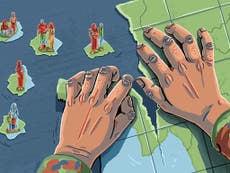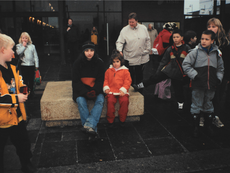Britain has blood on its hands over the brutal suffering of refugees across the Channel
It’s not just that we are doing as little as possible under the legislative framework. We are actively outsourcing our border too

There’s a boy with his head slumped into his chest. He’s seven years old, tucked under his mum’s arm. He looks up to her and sees a steady stream of tears slowly roll down her cheek as her face rests motionless. He stands up and presses his palm against her face as he wipes away her tears. He’s now rubbing her shin up and down, speaking softly to console her.
It’s heartbreaking enough to see a mother cry out of desperation. It’s truly gut-wrenching to see a young boy capable of understanding and internalising his own mother’s desperation. Too shy to play with the other children in the camp yet brave enough to carry the weight of his family’s optimism, he tells his mum that everything is going to be OK.
I thought that my biggest fear was failing to protect my children. I was wrong; it’s my children consoling me as I realise this protection is out of my hands. There are roughly 500 refugees in Grande-Synthe near Dunkirk. About 200 of these take shelter inside a gymnasium, barely fit for purpose. The rest are outside, sleeping in tents.
I met two mothers, each of whom had children with autism. At the best of times, people with autism find it difficult to communicate their experience of the world. These kids’ experience is one of persecution, war and abandonment. And instead of receiving the tailored support they need to help with social interaction, they live in cramped tents, far away from any kind of comfortable familiarity on which they once depended for a sense of normality.
If Dunkirk was a site of trauma, then the camp at Calais was a site of sheer brutality, home to around a thousand refugees. I had been there earlier that day with Care4Calais. Founded in November 2015, a group of volunteers deliver essential aid and support to those who have fled persecution and conflict. It’s relentless, not least because the police come almost daily to destroy refugees’ possessions, tents, clothes and food.
This barbarity typifies something about the way in which these people are treated, documented and understood: the refugee’s existence, experience and exposure is of being forced into invisibility. Whether they are being physically tortured into disappearance by the police, or expelled from people’s psyches for the avoidance of guilt, refugees have become the hidden faces of global displacement.
Despite media attention hitting its peak in 2016, large periods of radio silence would make anyone think that refugees aren’t still drowning at sea or piecing together an existence in perilous conditions.
National governments, too, are in the business of making refugees disappear. Despite making the treacherous journey across the Channel to the UK, many refugees who escape French state violence are sent straight back.
The way the UK interprets current European Union rules, known as the Dublin Regulation, the first EU country that asylum seekers enter is treated as the one responsible for examining their claim.
With the help of Eurodac, an EU-wide fingerprint database, asylum seekers are treated like damaged goods: scanned and returned from whence they came. With the lowest rate of asylum approvals among big European countries, the UK has exploited its island status to shirk its moral responsibilities.
It’s not just that Britain is doing as little as possible under the legislative framework. We are actively outsourcing our border; last year we paid £44.5m for refugee-detection technology in Calais and Dunkirk. If we were serious about our moral obligations, we would immediately set up an office at Calais so those seeking asylum in the UK do not have to cross the Channel to lodge their claim.
Without this infrastructure, we have blood on our hands for every person who loses their life on this perilous route.
The sad truth is that governments will only take responsibility when it becomes electorally costly for them not do so do. We must all, then, make a concerted effort to put this humanitarian crisis back on the radar.
The way to do this is not to simply broadcast, but to engage with refugees as individuals. They must be given a voice in their own narrative so we can listen to their stories of loss, their memories of their lives back home and their struggles to belong.
These people cannot be erased. Otherwise we will all be complicit in a reprehensible magic trick: making hundreds of thousands of human beings disappear.
David Lammy is Labour MP for Tottenham. If you want to make a difference, visit Care4Calais here






Join our commenting forum
Join thought-provoking conversations, follow other Independent readers and see their replies